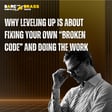
Getting Addicted to the Process and Chasing Excellence
What happens when you go all in and bet on yourself?
Taylor McClatchie, professional Muay Thai fighter with ONE Championship, joins the show to share how she did just that.
She spent a decade in reproductive science, working in a lab. Then she walked away from it all to turn her pastime into her profession. Went 20-0 as an amateur. Made her pro debut at Madison Square Garden with a head kick knockout. Has competed 65 times—exceptionally rare for a North American woman in combat sports.
This episode isn't about technology. It's about what happens when you stop following the prescribed steps and start building a life around what actually matters to you.
Taylor didn't fall in love with winning. She fell in love with the process. With adding one more piece to training camp—sprints, nutrition coaching, strength work—and never taking them away. With waking up and doing it again.
She talks about needing three types of sparring partners: people worse than you to test new skills, people at your level to compete with, and people better than you just to survive the round. "I never want to be the best person in the room because what am I getting from beating up on the new kids?"
The parallel to our industry is unavoidable. You can't grow if you're always punching down. You need to be uncomfortable. You need rounds where you're just trying to survive.
We spend a lot of time on this show questioning whether technology actually serves human interests. Sometimes the best lessons come from outside our world entirely—from someone willing to abandon the expected path to pursue something real.



















